Music creates and fosters community by speaking to people's needs, hopes, fears, and intimate lives -- and so does politics. Musicians have responded to this connection in a variety of ways over time. As the host of Down Home Radio, I thought it would be worthwhile to compile a brief survey of how certain musicians who inspire me chose to explore the realm of politics. Obviously, I have only touched on a few musicians here, so please respond with amendments, qualifications, additions and corrections.
Pete Seeger (b. 1919)
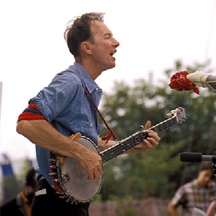
Pete Seeger has worked it from almost every angle over his long career. He started out in the 1930s playing at union meetings, and in 1948, hit the road with Progressive party presidential candidate Henry Wallace to sing songs at campaign rallies. In the era of the civil rights and peace movements, Seeger appeared at demonstrations large and small, using his celebrity to draw crowds and attention to a wide range of issues, from war, to nuclear power, to ecological awareness. He believes strongly in empowerment and community building through grassroots organizing and group singing, which blurs the line between artist and audience. Seeger has also written (or had a hand in adapting) such political anthems as "We Shall Overcome," as well as specific topical songs, smaller in scope, for particular events and times, to achieve specific goals. Some of his "political" songs have a more reflective nature, such as "Where Have All the Flowers Gone" and "Turn, Turn, Turn." Seeger has also played an important role in documenting, promoting, and popularizing the music of oppressed rural populations within the U.S., including blacks and poor whites.
Alan Lomax (1915-2002)
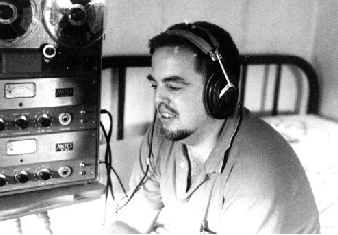
Alan Lomax was a folklorist and musicologist who made extensive field recordings throughout the United States and Europe beginning in the 1930's. He was successful in promoting his musical discoveries to mass audiences through books, radio broadcasts, and record releases, and was the first to champion the music of Leadbelly and Woody Guthrie, among others, to large audiences. Through field recording, Lomax sought to make people -- particularly disenfranchised people with little access to media representation -- proud of themselves and their own culture, empowering them psychologically to stand up for themselves. He called this the fight for cultural equity, and observed that when people would hear their own music recorded and played back to them, they'd realize that their own stuff was as good as anything on radio or TV. Through the wide dissemination of local folk musics, Lomax also sought to make disparate groups, and the public as a whole, aware of the common humanity of all people.
Here's an excerpt from Lomax’s “An Appeal for Cultural Equity†(1972):
Man, the economist, has developed tools and techniques to exploit every environment. Man, the most sociable of animals, has proliferated endless schemes which nurture individuals from birth to old age. Man, the communicator, has improvised and elaborated system upon system of symboling to record, reinforce, and reify his inventions. Indeed, man’s greatest achievement is in the sum of the lifestyles he has created to make this planet an agreeable and stimulating human habitat.
Today, this cultural variety lies under threat of extinction. A grey-out is in progress which, if it continues unchecked, will fill our human skies with smog of the phony and cut the families of men off from a vision of their own cultural constellations. A mismanaged, over-centralized electronic communication system is imposing a few standardized, mass-produced, and cheapened cultures everywhere.
The danger inherent in the process is clear. Its folly, its unwanted waste is nowhere more evident than in the field of music. What is happening to the varied musics of mankind is symptomatic of the swift destruction of culture patterns all over the planet.
One can already sense the oppressive dullness and psychic distress of those areas where centralized music industries, exploiting the star system and controlling the communication system, put the local musician out of work and silence folk song, tribal ritual, local popular festivities and regional culture.
Punk bands like Crass (1977-1984)
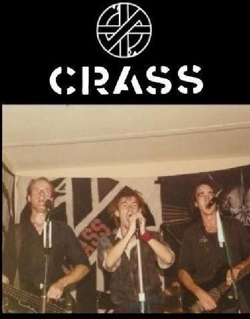
Crass employed plain-talking, working class-oriented language to deliver direct, practical, and ideological messages. The tone of the music is angry and aggressive, though the essential message of Crass, and many bands like them, is pacifistic. More hardcore bands such as Rage Against the Machine also rely on an aggressive sound. Formed in 1977, Crass was an early example of the still-vibrant anarchist punk culture, which extends beyond music to include, dress, visual art, film and other media, all with a do-it-yourself aesthetic. As part of its egalitarian message, punk is meant to blur the line between artist and audience, because it's simple music that nearly anyone can start playing right away, which makes it similar to folk music. Many punk bands have also taken part in direct action protests to oppose war, racism, and globalization and promote feminism, environmentalism and animal rights.
From Crass's song "Do They Owe Us A Living?":
Fuck the politically minded, here's something I want to say,
About the state of nation, the way it treats us today.
At school they give you shit, drop you in the pit,
You try and try and try to get out, but you can't because they've fucked you about.
Then you're a prime example of how they must not be,
This is just a sample of what they've done to you and me.
Do they owe us a living?
Of course they do, of course they do.
Owe us a living?
Of course they do, of course they do.
Owe us a living?
OF COURSE THEY FUCKING DO.
Rock stars like Bono (b. 1960)

Bono, leader of the anthemic Irish band U2, is probably the best-known philanthropist in rock. He has organized and played in many benefit concerts, and is committed to promoting debt relief for Third World countries. His efforts have included the RED campaign by companies that donate a portion of their RED-branded products profits to African relief. Bono has employed a top-down approach to advocate positive action, meeting personally with world leaders across a wide range of government, business, and religious institutions. His charitable endeavors in Africa have been considerable, but Bono has also been criticized for increasing dependency and corruption there while failing to work with local grassroots organizations.
Bono has been nominated for the Nobel peace prize three times. In 2005, he was named Person of the Year by Time magazine, and was knighted by the British empire two years later. Bono is by no means an anti-establishment figure -- he's a capitalist with big-time investments in the entertainment industry. He knows how to leverage his connections in celebrity culture, and uses his superstar status to work for positive goals within the system.
U2 has recorded many songs dealing with political issues, including “Sunday Bloody Sunday,†which recounts the horrors of the decades-long religious struggle between Britain and North Ireland. The lyrics ask what this street war has really accomplished, and pleads for an end to the violence. U2 drummer Larry Mullen says,
We're into the politics of people, we're not into politics. Like you talk about Northern Ireland, "Sunday Bloody Sunday," people sort of think, "Oh, that time when 13 Catholics were shot by British soldiers"; that's not what the song is about. That's an incident -- the most famous incident in Northern Ireland -- and it's the strongest way of saying, "How long? How long do we have to put up with this?" I don't care who's who -- Catholics, Protestants, whatever. You know people are dying every single day through bitterness and hate, and we're saying why? What's the point?
Lyrics from “Sunday Bloody Sunday," 1983:
Broken bottles under children's feet
Bodies strewn across the dead end street
But I wont heed the battle call
It puts my back up
Puts my back up against the wall
Sunday, bloody Sunday
Sunday, bloody Sunday
Sunday, bloody Sunday (Sunday bloody Sunday...)
(all right let's go!)
And the battle's just begun
There's many lost, but tell me who has won
The trench is dug within our hearts
And mothers, children, brothers, sisters torn apart
Woody Guthrie (1912-1967)

Woody Guthrie created a unique synthesis of topical political songwriting and timeless art in the folk idiom. "Pastures of Plenty," "This Land is Your Land," "Tom Joad" and other Guthrie originals are also just good, fun, gripping songs that you might sing on any occasion (or at least I would!). Hanging out on the Communist left in the 1930’s and 40’s, Guthrie embraced the spirit of the Popular Front, when the CP was fused with the broader mainstream of liberal politics. "Communism is 20th Century Americanism" was the slogan of the time, and Guthrie often expressed this kind of progressive patriotism in his writing, playing for union rallies and other leftist events during his brief career as a performer. A highly accomplished old-time/cowboy/country singer, Guthrie seemed to operate at a deeper, more fundamental level than many of his left-wing contemporaries, writing great political songs that were simple to play, eminently singable, and profound. This is a feat matched by very few performers since, most notably Bob Dylan in a folk-like style and Bob Marley in reggae.
Joe Hill (1878-1915)

Joe Hill was a songwriter and organizer in the early part of the 20th century for the International Workers of the World, also known as the Wobblies. The primary goal of the IWW was to organize workers into "One Big Union" to fight the bosses for better wages and working conditions, and ultimately achieve the foundation of a more humane society. Hill employed parody to satirize old hymns, folk music, and popular tunes to create songs useful in organizing IWW chapters. "The Preacher and the Slave," for example, written to the melody of the 19th century hymn "In the Sweet Bye and Bye," talked about the role of religion in pacifying exploited people. The bosses would often dispatch Salvation Army bands (dubbed by the Wobblies the "Starvation Army") to break up the IWW's street meetings, so songwriters like Hill would write new lyrics to the traditional melodies that these bands would play and then sing their own words over the bands when they arrived -- brilliant musical-political jujitsu. Hill's career ended in 1915, when he was set up on a murder charge and executed in Utah.
"The Preacher and the Slave":
Long-haired preachers come out every night,
Try to tell you what's wrong and what's right;
But when asked how 'bout something to eat
They will answer with voices so sweet:
Chorus:
You will eat, bye and bye,
In that glorious land above the sky;
Work and pray live on hay,
You'll get pie in the sky when you die.
And the Starvation Army they play,
And they sing and they clap and they pray.
Till they get all your coin on the drum,
Then they'll tell you when you're on the bum:
Chorus
Tom Lehrer (b.1928)
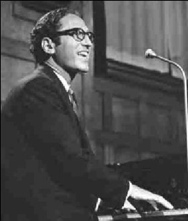
Tom Lehrer is a songwriter and mathematician who uses humor to create socially conscious music that's fun and accessible to a wide audience. He often subverts the show-tune format, parodying Gilbert and Sullivan, as well as writing songs in his own distinctively dry and witty style. His popularity grew in the 1950's with songs satirizing such Cold War-era topics as nuclear proliferation, militarism, race relations, religion, and fear of World War III. In the "Vatican Rag," for example, Lehrer offered advice to the Catholic Church about updating their liturgical music to appeal to contemporary audiences:
First you get down on your knees,
Fiddle with your rosaries,
Bow your head with great respect,
And genuflect, genuflect, genuflect!
"Send the Marines" focused on American militarism and foreign intervention:
When someone makes a move
Of which we don't approve,
Who is it that always intervenes?
U.N. and O.A.S.,
They have their place, I guess,
But first send the Marines! ...
...What do we do? We send the Marines!
For might makes right,
And till they've seen the light,
They've got to be protected,
All their rights respected,
'Till somebody we like can be elected.
Rappers like Chuck D, Immortal Technique, Dead Prez and many others
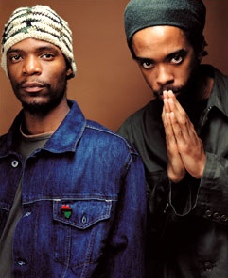
Socially conscious rap groups use tough and inventive language to address social and political concerns from a personal perspective. There is an extensive tradition of protest songs in rap, going back to the genre's creation and further still to the socially-conscious calypso of the Caribbean. Even groups that are not known for being socially conscious or progressive, like the Geto Boys, address corruption and hypocrisy in songs like "Damn It Feels Good 2 Be A Gangsta." I've often compared Common's song "Assata" -- based on Black Panther Assata Shakur's autobiography -- to Woody Guthrie's "Tom Joad," which was based on John Steinbeck’s The Grapes of Wrath.
In the Spirit of God.
In the Spirit of the Ancestors.
In the Spirit of the Black Panthers.
In the Spirit of Assata Shakur.
We make this movement towards freedom
for all those who have been oppressed, and all those in the struggle.
Yeah. Yo, check it...
Assata had been convicted of a murder she couldna done
Medical evidence shown she couldna shot the gun
It's time for her to see the sun from the other side
Time for her daughter to be by her mother's side
Time for this Beautiful Woman to become soft again
Time for her to breathe, and not be told how or when
She untangled the chains and escaped the pain
How she broke out of prison I could never explain
And even to this day they try to get to her
but she's free with political asylum in Cuba.
Though the Geto Boys have written some really over-the-top violent and offensive songs, this is the last verse of "Damn It Feels Good To Be A Gangsta":
And now, a word from the President!
Damn it feels good to be a gangsta
Gettin voted into the White House
Everything lookin good to the people of the world
But the Mafia family is my boss
So every now and then I owe a favor gettin' down
like lettin' a big drug shipment through
And send 'em to the poor community
So we can bust you know who
So voters of the world keep supportin' me
And I promise to take you very far
Other leaders better not upset me
Or I'll send a million troops to die at war
To all you Republicans, that helped me win
I sincerely like to thank you
Cuz now I got the world swingin' from my nuts
And damn it feels good to be a gangsta
Immortal Technique uses self-aggrandizement, which is a common theme in rap, to talk about both personal and social liberation. He has also sampled the speeches of Malcolm X in his songs. From "Revolutionary":
Technique will force you into strategical retreat
Because I dominate guerrilla warfare in the streets
There ain't no way to picture me without a victory speech
When I reach higher positions
Without the recognition of pissed on competition
Cause I conquered their ambitions
In a systematic form like a religionist tradition
My mission is to take you, lyrically break you
Lyrically assassinate you
Lyrically incinerate your body and recreate you
To destroy the power that mentally incarcerates you...
[Malcolm X sample]
"Revolutions overturn systems, revolutions destroy systems!" [crowd cheers]
Music is often the best remembered and loved part of social/political struggles through out history, but the most important element of political music is the music, which is why we care in the first place.

